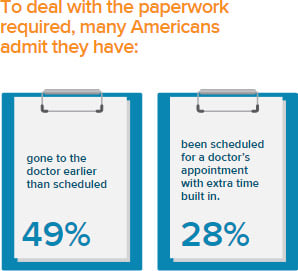While millions of people across the country are open to using technology for a variety of key healthcare needs, the system is not yet living up to their expectations, according to results from Surescripts’ Connected Care and the Patient Experience survey. Said survey was conducted by Kelton Global from May 1-8, 2015, with participation from more than 1,000 adult Americans across the nation.
Americans say doctors still walk into most appointments without critical information about their patients, with 55% reporting their medical history tends to be missing or incomplete, and nearly half (49%) noting that their doctor is not aware of what prescriptions they are taking. Further, patients report that their doctor usually does not already know their allergies (61%) or existing medical conditions (40%), or know about recent surgeries, hospitalizations or visits with other doctors (44%). Four in ten Americans note that during most visits to the doctor, the office does not have their personal (40%) or insurance (38%) information on file; and 29% of patients (close to 70 million individuals) need to fax or physically transport test results, X-rays, or health records from one doctor’s office to another.
“This survey proves patients take notice and are ready for a change,” said Tom Skelton, CEO of Surescripts. “As an industry, we need to come together to connect the nation’s healthcare system – to enhance the patient experience while improving quality and lowering the cost of care.”
Unnecessary paperwork and phone calls make patients dread visiting the doctor more than other everyday tasks, with half of all respondents saying that renewing a driver’s license would require less paperwork than seeing a new doctor for the first time. In fact, Americans are just as likely to be frustrated when filling out paperwork at a doctor’s office (57%) as they would be when buying a new car (54%). Moreover, many Americans would rather call customer service for their bank (34%), cell phone provider (27%), or credit card company (22%) than their health insurance provider.
Despite advancements in digital technology, paper is still persistent throughout healthcare: 55% of Americans report they frequently or always sign their names on paper forms, 54% have their insurance card or ID photocopied or scanned, 33% write their personal information on paper forms, and 28% write details of their medical history on paper forms (28%).
 On average, Americans spend about five minutes filling out paperwork, compared to six minutes typically spent verbally sharing their medical history and a third of the time they spend meeting with their doctor altogether (15%). As a result, 49% of patients admit to showing up early and nearly one in three patients (28%) believe the doctor’s office scheduled an appointment with extra time built in to handle paperwork.
On average, Americans spend about five minutes filling out paperwork, compared to six minutes typically spent verbally sharing their medical history and a third of the time they spend meeting with their doctor altogether (15%). As a result, 49% of patients admit to showing up early and nearly one in three patients (28%) believe the doctor’s office scheduled an appointment with extra time built in to handle paperwork.
Americans reported that they feel doctors using computers or tablets over paper during a visit are organized (70%), efficient (70%), innovative (40%) and competent (33%). Practices that have adopted technology to replace outdated methods of administrative tasks, such as scheduling appointments online, provide patients a sense of relief (68%), confidence (65%) and comfort (55%).
If patients were able to communicate with their doctor via email or text instead of phone only, they would become far more open with their existing doctors — 51% would feel less rushed when asking questions, 46% would feel more comfortable asking questions, and 43% would reach out to their doctors more often.
And if providers adopt new technologies, 40% of patients would be more likely to recommend their doctor to others, and 36% would be less likely to switch to a new doctor. If evaluating two comparable doctors, more than half of patients would select a doctor that let them fill out paperwork online before a visit (51%), receive test results online (48%), store medical records electronically (46%), or schedule appointments online (44%).
“It’s clear that patients are willing and able to play a more active role in managing their care, and with improved access to technology and information sharing between doctors and patients, the entire healthcare system will benefit,” said Leslie Kelly Hall, Senior Vice President of Policy at Healthwise and the Informed Medical Decisions Foundation.


